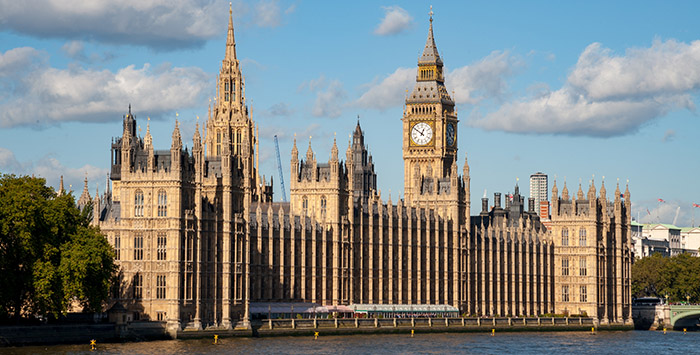MPs have been urged to back an amendment to the Agriculture Bill designed to prevent UK farmers being undercut by lower standard imports.
As the era-defining Bill returns to the Commons today, Neil Parish, chair of the Environment, Food and Rural Affairs Committee, has called on MPs to back his amendment providing this protection in law, while a coalition of farming, environmental and animal welfare organisations has written to all 650 MPs urging them to ensure the Bill includes the safeguards.
The Bill, which will result in the biggest reform and transformation of British agriculture and food production since 1945, returns for its final Report stages today before heading to the House of Lords.
Mr Parish said much of the Bill is welcome. “Absent, however, is any legal commitment to maintain our high environmental, food and animal welfare standards for imports under new trade deals,” he wrote in an article for the Conservative Home website.
But he wants to go further by enshrining these promises in law. “We have promised not to reduce our high domestic standards. So we should not undermine them through trade deals,” he added.

“There is no point having world-leading standards in the UK if we do not expect trade partners to reciprocate. Allowing preferential access to food imports produced to lower standards will put many of our farmers at a competitive disadvantage and out of business. “Not only will this export jobs in farming and food production, it will export the impact of this production, turning a blind eye to poor animal welfare standards abroad and encouraging environmental degradation there. We will be exporting control, not taking it back.”
He has previously tabled an amendment to the Agriculture Bill, New Clause 2, that would prevent the ratification of a trade agreement that allows the importation of agricultural or food products which have not been produced to equivalent standards.
“These issues should be front and centre,” he said, urging MPs to back his amendment, which already has the support of the EFRA Committee and a growing number of backbenchers, too.
He responded to an article by former Trade Minister Liam Fox, who previously clashed with former Defra Secretary Michael Gove on the issue of chlorinated chicken, which suggested that this sort of amendment would prevent imports under any trade agreement if UK standards on animal welfare were not applied in the country of origin.
Pointing out that a minimum of equivalence, does not mean ‘the same’, Mr Parish said this was an ‘unfortunate conflation’.
“Just as we have argued in our negotiations with the EU, there are different ways to reach the same high standards,” he wrote. “Within the framework of trade negotiations, we can put in conditionality.
He suggested the UK could ask negotiating partners that, in order to get preferential access to our market, certain rules be respected, helping us to ‘drive a harder bargain’.
“If we truly intend to keep to our manifesto promise that we will not compromise on standards, then the Government should have no issue with New Clause 2 being adopted,” he said.
Huge Coalition
Meanwhile, the NFU has convened a ‘huge coalition’ of farming, environmental and animal welfare organisations to write to all 650 MPs and urge them to ensure the new Agriculture Bill includes the necessary safeguards on food safety animal welfare standards and environmental protection.
The letter, backed by the NPA, asks MPs to speak up for British food and farming in today’s House of Commons debate.
“The Bill should ensure that agri-food imports are produced to at least equivalent environmental, animal welfare, and food safety standards as those required of producers in the UK,” it says.
“We are all agreed that a trade policy that undermines our farmers will mean a common goal of a more prosperous, sustainable and nature-friendly food and farming sector will be made much harder to achieve. And the UK will have missed an opportunity to set out its stall as being serious about tackling its global footprint.”
You can see the NPA’s position on the Agriculture Bill can be viewed here
The letter’s signatories include:
Minette Batters – President, National Farmers Union
Beccy Speight – Chief Executive, RSPB
Chris Sherwood – Chief Executive, RSPCA
Miriam Turner and Hugh Knowles – Co-Chief Executives, Friends of the Earth
Mark Bridgeman – President, CLA
Hilary McGrady – Director-General, National Trust
Helen Browning – Chief Executive, Soil Association
Sue Davies – Head of Consumer Protection and Food Policy, Which?
Patrick Holden – Chief Executive, Sustainable Food Trust
Shaun Spiers – Chair, Greener UK & Executive Director, Green Alliance
Craig Bennett – Chief Executive, The Wildlife Trusts
Richard Benwell – Chief Executive, Wildlife and Countryside Link
Kath Dalmeny – Chief Executive, Sustain: The alliance for better food and farming
John Davies – President, NFU Cymru
Caroline Drummond – Chief Executive, LEAF
George Dunn – Chief Executive, Tenant Farmers Association
Ivor Ferguson – President, Ulster Farmers Union
Jyoti Fernandes MBE – Chair, Landworkers Alliance
Martin Lines – UK Chair, Nature-Friendly Farming Network
Andrew McCornick – President, NFU Scotland
Darren Moorcroft – Chief Executive, Woodland Trust
Kate Norgrove – Executive Director of Advocacy and Campaigns, WWF-UK
Doug Parr – Chief Scientist, Greenpeace
James Thornton – Chief Executive, ClientEarth
James Robinson – Conservation Director, Wildfowl and Wetlands Trust
Sarah-Jane Laing – Chief Executive, Scottish Land & Estates.




